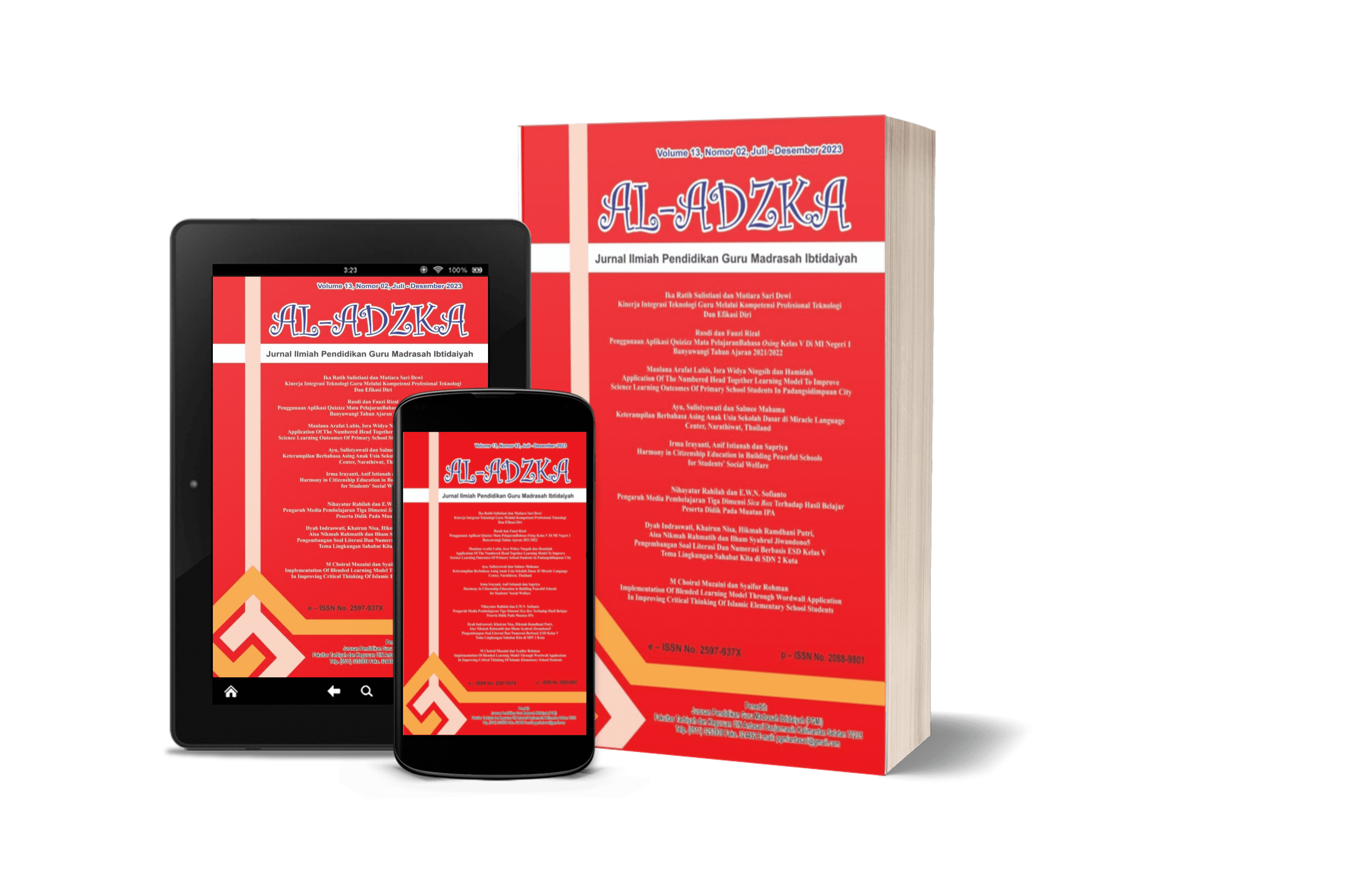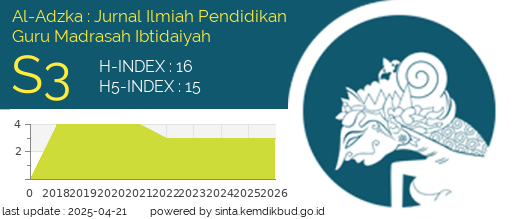Implementation of Environmental Education in Improving The Environmental Ethics of Madrasah Ibtidaiyah Students To Support SDGs 2030
DOI:
https://doi.org/10.18592/aladzkapgmi.v12i2.7490Keywords:
environmental ethics, environmental education, SDGs 2030Abstract
Madrasah Ibtidaiyah (MI) as an educational institution has an important and strategic role in implementing environmental education for its students so that it can improve students' environmental ethics as a form of support for the SDGs 2030. The purpose of this research is to describe the concept and implementation of environmental education in MI and its support for SDGs 2030. This study is qualitative, with field research being conducted in two MI, namely MI NU Rowolaku and MIN Pekalongan. Data obtained by using the methods of observation, interviews, and documentation The data obtained was then analyzed using Miles and Huberman's qualitative analysis method, which included data collection, data reduction, data presentation, and verification or drawing conclusions. The results showed that MI NU Rowolaku, which has not yet received the status of an adiwiyata school, already has a simple concept of environmental education, but its implementation is good enough so that its carrying capacity for sustainable development goals is classified as moderate. Meanwhile, MIN Pekalongan, which already holds the title of Adiwiyata school, has a clear and measurable concept of environmental education and excellent implementation, so that it has the carrying capacity for sustainable development goals in the high category.References
Aini, T. N., Akbar, S., & Winahyu, S. E. (2021). Implementasi Program Adiwiyata Berbasis Partisipatif Dalam Menumbuhkan Nilai-Nilai Karakter di Sekolah Dasar. Sekolah Dasar: Kajian Teori Dan Praktik Pendidikan, 30(1), 57–70. https://doi.org/10.17977/um009v39i12021p057
Asih, E. D. (2021). Pengaruh Sarana Prasarana Pendidikan dan Lingkungan Keluarga Terhadap Hasil Belajar di SD 023 Teluk Binjai Dumai. TADZAKKUR, 2(1), 51–61.
Harjianto, H., Febyanti, R. F., & Efendi, Y. K. (2021). Penerapan Pendidikan Karakter Peduli Lingkungan Melalui Program Adi Wiyata di SMK Negeri Kalibaru Sebagai Upaya dalam Mendukung Gerakan Banyuwangi Merdeka Dari Plastik. Jurnal Ilmiah Universitas Batanghari Jambi, 21(3), 969–974. https://doi.org/10.33087/jiubj.v21i3.1609
Karakaya, F., & Yilmaz, M. (2017). Environmental ethics awareness of teachers. International Electronic Journal of Environmental Education, 7(2), 105–115.
Khoirul Anam, M., & and Sudarti. (2020). The Preliminary Studies of Environmental Ethnics In Junior And Senior High School Students Through Environmentally Sound Learning. ScienceEdu, 3(2), 16–19.
Khuzaimah, U., Baliwati, Y. F., & Tanziha, I. (2021). Peranan Pilar Tujuan Pembangunan Berkelanjutan Terhadap Penanganan Gizi Kurang di Provinsi Jawa Barat (The Role Of Pillar Sustainable Development Goals Relate to Tackling Undernutrition in West Java Province). Amerta Nutrition, 5(3), 196–210. https://doi.org/10.20473/amnt.v5i3.2021.196-210
Majdi, M. (2019). Program Sekolah Adiwiyata Dalam Pengembangan Sosio-Emosional Anak Usia Dasar di SDN Ngupasan Yogyakarta. Al-Adzka: Jurnal Ilmiah Pendidikan Guru Madrasah Ibtidaiyah, 9(2), 85–98.
Mauluah, L., Marsigit, M., & Wangid, M. N. (2020). Elementary Math Learning Design: An Integration with Islamic Environmental Ethics in the First Grade. TARBIYA: Journal of Education in Muslim Society, 7(2), 252–259. https://doi.org/10.15408/tjems.v7i2.19975
Mizani, H., & Ramli, M. (2022). Developing An Islamic Educational Environment For Elementary School / Madrasah Ibtidaiyah -Age Children. Al-Adzka: Jurnal Ilmiah Pendidikan Guru Madrasah Ibtidaiyah, 11(2), 103–112. https://doi.org/10.18952/aladzkapgmi.v11i2.4990
Nainggolan, J. (2021). Peningkatan Kemampuan Guru dalam Pengembangan Silabus dan RPP Melalui Pola Pembinaan Profesional dengan Pendekatan Kooperatif di SMAN 9 Medan Kec. Medan Labuhan Semester 2 Tahun Pelajaran 2017/2018. PROVIDENSI: Jurnal Pendidikan Dan Teologi, 4(1), 122–142.
Nantara, D. (2022). Pembentukan Karakter Siswa Melalui Kegiatan di Sekolah dan Peran Guru. Jurnal Pendidikan Tambusai, 6(1), 2251–2260.
Omran, M. S. (2014). The Effect of Educating Environmental Ethics on Behavior and Attitude to Environment Protection. European Online Journal of Natural and Social Science, 3(3), 141–151.
Rahayu, D. D., Mustopa, B. A. B., Bayani, C., Shofuh, A., Ayu, L. A., & Fitrianingsih, L. (2022). Analisis Penyelenggaraan Bank Sampah Asyik 19 Bojonggede Tahun 2021. Ruwa Jurai: Jurnal Kesehatan Lingkungan, 16(1), 1–8. https://doi.org/10.26630/rj.v16i1.2975
Rehman, H. A., Hasan, H., & Muhammad, M. (2022). Compatibility of Sustainable Development Goals (SDGs) with Maqasid al-Shariah: Are there any Missing Goals. Islamic Banking and Finance Review, 8(2). https://doi.org/10.32350/ibfr.82.05
Romualdi, K. B., & Kumalasari, D. (2022). Pengaruh Keteladanan Guru dalam Implementasi Pendidikan Karakter: Tinjauan Perspektif Peserta Didik. Pendekar : Jurnal Pendidikan Berkarakter, 5(2), 130–137.
Sauvé, L. (1996). Environmental Education and Sustainable Development: A Further Appraisal. Canadian Journal of Environmental Education (CJEE), 1(Spring), 7–34. http://jee.lakeheadu.ca/index.php/cjee/article/view/490
Sitorus, L., & Lasso, A. H. (2021). Pendidikan Karakter Peduli Lingkungan Melalui Pembiasaan dan Pembudayaan di Sekolah Menengah Pertama. Edukatif : Jurnal Ilmu Pendidikan, 3(5), 2206–2216.
Supadmini, N. K., Wisnu Budi Wijaya, I. K., & Larashanti, I. A. D. (2020). Implementasi Model Pendidikan Lingkungan UNESCO Di Sekolah Dasar. Cetta: Jurnal Ilmu Pendidikan, 3(1), 77–83. https://doi.org/10.37329/cetta.v3i1.416
Tampubolon, Y. H. (2022). Menilai Dampak Etika Lingkungan Terhadap Kerusakan Lingkungan: Sebuah Pertimbangan Melampaui Moralisme. JURNAL YAQZHAN: Analisis Filsafat, Agama Dan Kemanusiaan, 8(1), 18–35. https://doi.org/10.24235/jy.v8i1.9309
Vita Fitriatul Ulya, Adhiesta Kurnia F. R., Z. A. (2021). Penguatan Nilai-Nilai Karakter Melalui Budaya Sekolah Pada Era New Normal di MI Bahrul Ulum Binangun Singgahan Tuban. Attadib: Journal of Elementary Education, 5(2), 204–212.
Yanti, Y., & Yusliani, E. (2020). Meta-Analisis : Pengaruh Integrasi Pendidikan Lingkungan dalam Pembelajaran IPA Terhadap Sikap Peduli Lingkungan Siswa. Jurnal Penelitian Dan Pembelajaran Fisika, 6(1), 9–16.
Yusmanila. (2021). Developing Teaching Materials In Integrated Natural Science Class Based On Inquiry Labs To Improve Students’ Science Literacy. JURNAL TARBIYAH, 28(1), 124–139.
Downloads
Published
How to Cite
Issue
Section
License
Authors who publish with this journal agree to the following terms:
- Authors retain copyright and grant the journal right of first publication with the work simultaneously licensed under a Creative Commons Attribution 4.0 International that allows others to share the work with an acknowledgement of the work's authorship and initial publication in this journal.
- Authors are able to enter into separate, additional contractual arrangements for the non-exclusive distribution of the journal's published version of the work (e.g., post it to an institutional repository or publish it in a book), with an acknowledgement of its initial publication in this journal.
- Authors are permitted and encouraged to post their work online (e.g., in institutional repositories or on their website) prior to and during the submission process, as it can lead to productive exchanges, as well as earlier and greater citation of published work.












